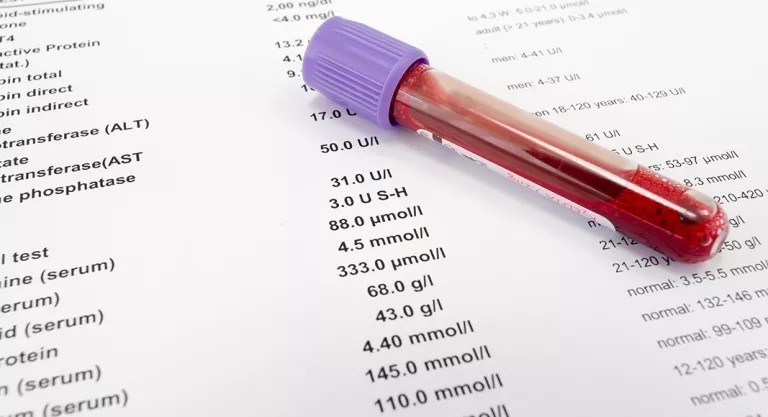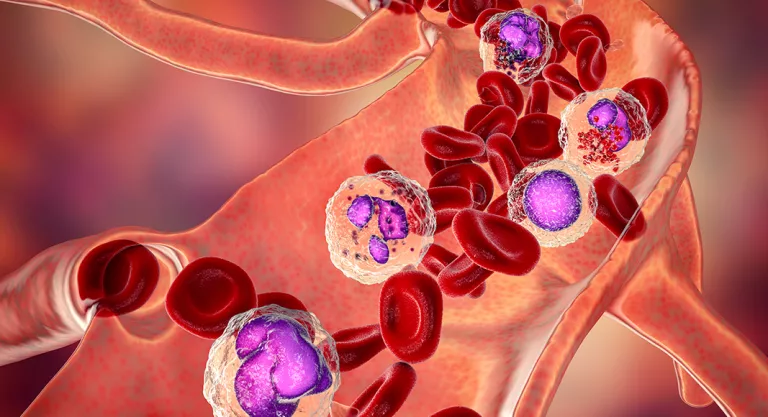What are monocytes and what function do they perform?
Monocytes are a type of leukocyte or white blood cell that is responsible for fighting pathogenic microorganisms, such as viruses or bacteria, so they are part of the body’s immune response. If its blood levels rise above normal, it can indicate that our immune system is failing and also warns of the possible appearance of infectious, inflammatory or autoimmune diseases, and even blood cancer, such as leukemia.
Dr. Eduardo López Granados, head of the immunology service at La Paz University Hospital, explains that when monocytes –which have their origin in the bone marrow– “migrate to the tissues, they become a cell called a macrophage, which performs various functions of the immune response. Some are basic, such as the ingestion and destruction (phagocytosis) of microorganisms and foreign substances, and others are complex, such as the regulation of the inflammatory response”.
Normal levels of monocytes and when there is monocytosis
The levels of monocytes in the blood help to know the immune status of a person and if they are higher than normal it can indicate that an inflammatory or infectious process is developing in the body. To find out this information, a “blood cell count with differential leukocyte count is performed, which is a basic test for any diagnostic evaluation, even in primary care, and allows early detection of changes in the monocyte count.”

After drawing blood from the patient, the pathologist makes a count of the different types of white blood cells present in the sample thanks to the use of a special dye. Monocytes normally constitute between 2 and 10% of the leukocytes in the blood, and in absolute terms they usually range between 100 and 900 cells per microliter, although these ranges can vary with gender and age, indicates Dr. López Granados . That is why it is necessary that the results of a blood test are always interpreted by a medical professional.
The moderate/high increase is called monocytosis and, according to the WHO, persistent monocytosis is defined as an increase in the absolute number of monocytes above 10%, with more than 1,000 monocytes per microliter in blood beyond three months.
Why do I have a high level of monocytes in my blood?
Dr. López Granados points out that the causes of increased monocyte levels can be divided into reactive or clonal. Reactive causes can lead to temporary monocytosis (due to acute infection, medications, tissue damage), or chronic (due to chronic infections or chronic inflammatory or autoimmune diseases).

Clonal elevations involve an abnormal expansion of monocytes due to abnormalities in the functioning of the bone marrow (myelodysplastic syndrome), or constitute a type of neoplasm of hematopoietic origin (leukaemia). There are acute forms -such as acute myeloid leukemia-, or chronic forms -such as chronic myelomonocytic leukemia-, which must be treated by specialists in hematology.
The most common causes of monocytosis are:
What Symptoms May Indicate Elevated Monocyte Levels
Monocytosis is not a disease in itself, but occurs in relation to another process and, therefore, may not cause symptoms, says the La Paz immunologist, who adds that the disease that has caused the levels of monocytes is what triggers the symptoms, which can be very varied.

“It can be associated with manifestations of infection, such as fever, enlarged lymph nodes, or inflammation (joint inflammation, other laboratory abnormalities, etc.). It can be associated with characteristic manifestations of leukemic processes”.
Monocytosis Treatment: How to Lower Monocyte Levels
The slight increase in monocytes may be nonspecific and not important, so it is recommended that its measurement be repeated after a while. In addition, there are no treatments aimed at reducing the levels of monocytes, but what is treated are the causes of monocytosis, that is, the diseases or alterations that have caused its appearance.
Sometimes the monocytosis that occurs as a result of the consumption of certain medications may not require treatment, says Dr. López Granados, who adds: “When the cause is reactive, treating the underlying disease with antibiotic or antiviral treatment would resolve it.”
In the event that the patient has a rheumatic or inflammatory disease, “anti-inflammatory or immunosuppressive treatments” would be indicated, “and protocols with cytoreductive and chemotherapy treatments in cases of leukemia”.

Taking into account that inflammation is one of the main reasons why monocytes rise, to prevent monocytosis it is advisable to avoid inflammatory states with good lifestyle habits, such as:
Why are monocytes low?
It can also happen that the levels of monocytes are below normal, a condition known as monocytopenia and that usually occurs as a result of a weakening of the immune system due, for example, to chemotherapy treatment, problems of health in the bone marrow, such as aplastic anemia, or infections such as HPV, among other causes.
“Low levels of monocytes – monocytopenia – are usually associated with a general decrease in leukocytes in the blood due to an infection, or a more general defect in the production of cells in the bone marrow (hematopoiesis)” -explains Dr. López Granados-. And he adds that “there is a very rare inborn error of immunity of genetic cause, called monoMAC syndrome, with intense monocytopenia and increased susceptibility to infections by mycobacteria, viruses and fungi.”
.













